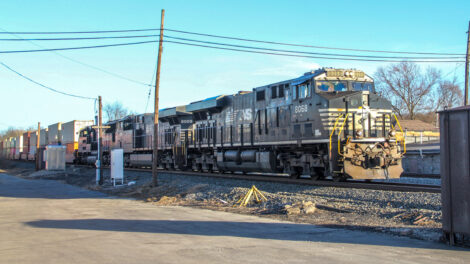
ARTICLE: Senate committee approves rail safety bill


Senate committee approves rail safety bill
A Senate committee approved the rail safety bill co-sponsored by Ohio’s two U.S. senators in response to the East Palestine train derailment disaster.
The bill will next be in front of the full Senate for consideration.
It will “move as quickly as possible” for a vote, said U.S. Sen. Sherrod Brown, D-Cleveland, who co-sponsored the bill with U.S. Sen. J.D. Vance, R-Cincinnati. President Joe Biden, a Democrat, has promised to sign the bill if it gets to his desk, Brown said.
Brown acknowledged it faces a larger challenge in the U.S. House with Speaker Kevin McCarthy, R-Calif., being “really tight with the rail lobby.”
The Senate Committee on Commerce, Science and Transportation approved the bill by a 16 to 11 vote during a Wednesday hearing in Washington, D.C.
All committee Democrats voted for the bill with Vance and U.S. Sen. Eric Schmitt of Missouri being the only two Republicans on the committee to vote in support.
The Senate has 51 members who are either Democrats or caucus with that party. All 51 back the bill, Brown said.
For the bill to move forward in the Senate, it would need 60 votes.
With Schmitt, there are seven Republican senators who have publicly supported the bill. It would need support from at least nine Senate Republicans.
U.S. Sen. Ted Cruz of Texas, the committee’s ranking Republican, said Wednesday: “I don’t believe it, as written, is likely to get 60 votes in the Senate and I think it is less likely, as written, to pass the House of Representatives.”
Asked about Cruz’s statement, Brown said: “He’s wrong. He was wrong about the bill in committee. He though there would be no Republicans with the exception of Vance. He tried to weaken it and he tried to slow walk it. We know we have the support of the country.”
Vance and Brown introduced the bill in response to the Feb. 3 Norfolk Southern rail derailment in East Palestine that caused the evacuation of much of the village and the release of toxic chemicals into the environment that is still being cleaned up.
No one was injured in the derailment, but several East Palestine residents have complained of headaches and other ailments as a result of the incident.
“What happened in East Palestine cannot be undone,” Vance said. “We cannot reverse it. We cannot change it. We cannot undo the psychological, economic and physical toll of the derailment in East Palestine. But I guarantee you whether it’s tomorrow or next week or next year, there will be another East Palestine in this country if we do not pass the Railway Safety Act. It’s that simple.”
The bill would enhance safety procedures for trains carrying hazardous materials, expand the types of materials listed as hazardous being transported by trains, require railroads to create disaster plans, tell emergency response commissions what hazardous materials are going through their states, establish requirements for wayside detectors every 15 miles, increase the time for rail car inspections, increase penalties for violations from up to $100,000 to $10 million, require at least two-member crews and ensure that fire departments are reimbursed costs when responding to major train derailments.
The train that derailed in East Palestine was carrying numerous chemicals not classified as hazardous, including vinyl chloride – a toxic chemical used in the production of plastics – and the lack of wayside detectors failed to discover in time that a wheel bearing had overheated causing the derailment. That train had a three-person crew.
“The most important thing this bill does is it ensures our firefighters and first responders have proper notice” about what chemicals are on board a train that derails, Vance said.
“People should not have to worry about what’s being transported through their communities,” said U.S Sen. Maria Cantwell, D-Wash. and chairwoman of the committee.
Cruz said of the rail safety act: “I remain concerned that this bill is overly and needlessly prescriptive in certain places.”
Cruz said, “In the hands of overzealous Biden bureaucrats, the mandates in this bill would make it much easier for this administration to restrict the transport of coal, of oil, of natural gas, of ethanol and the burdens of moving those commodities would carry over to the many other trains in the rail network that carry crops and building materials and cars to market. That means more time and cost to deliver everything.”
In direct response, Vance said that the bill may make rail “a little bit more expensive, but in the service of safety. Let’s be honest, we have allowed the rail industry to socialize the risk of their business while privatizing the rewards. The people of East Palestine are going to deal with the costs of what Norfolk Southern did for the next generation – the mental health costs, the physical health costs, the economic damage, the loss of home and property value.”